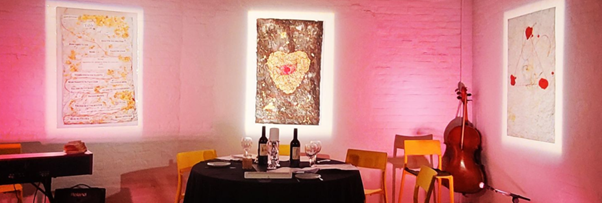As always, I am sat, happily within a chaos of structure and creativity. Last week I managed to have a small but significant dream realised. ‘The table of consciousness’ played out to a full house. This was a play that was drawn up from the images and themes that had surfaced over years of navigating trauma as an academic, a practitioner, a man, a boy, a child, a mind, a soul.
I first mentioned its reality in my mind to Jonathan Barnes my PHD supervisor. We were sat at his beach hut, and the table came with us. I explained that it was a table with a central light and those bodies at the table were all manifestations of my mind and my experiences or being loved or attempting to love my false self. Jonathan then mentioned the poem by George Herbert ‘Love bade me welcome’, this became a catalyst for me developing more depth to the truths. https://freerangecanterbury.org/the-table-of-consciousness/
The light or candle in the centre of the table is a vital part of the tale told. Yet it is left unexplained. Reading the works of Nietzsche, and the death of the archetype (Jung) I became aware of the enlightener alongside the Anima and the animas. The light is the pathway between the conscious and the subconscious. I wanted to help the audience become aware of this through the expression in the characters at the table but also the art on the walls and in the themes of music I constructed with the creative director of free range arts collective Sam Bailey https://freerangecanterbury.org/ Sam has become a dear and very warm hearted friend. I know that I and my research would have died if it had not been for his ability to see and in his words ‘I TRUST IN THE WORK’.
Within the Times Higher education magazine (no 2,528) 2023 p44 the words are music to my ears. Creativity is the ability to form truth from chaos and then try again. It’s the Statements of Whitehead within the aims of education that are helping bolster my contextual documents for my #Phdofwhat. He says knowledge must be kept alive once pulled from the sea, ideas left on their own keep no better than fish. Imagination is the water that flows and is contagious. This reminds me of a Buddhist tale. Being asked to fetch water Ananda saw only the mud and the leaves and so returned to Buddha with nothing. He was then made aware of the lesson in being asked to return to the stream.
——————————————————————————————————————–
“Things happen on their own. The leaves were going down the stream and the mud was settling. And just sitting there watching the stream, I got the message, that this stream is the stream of my mind – of all rotten thoughts, past, dead, mud – and I am continuously trying to settle it. Jumping into it makes it worse than before and creates a pessimistic attitude that ‘perhaps in this life I am not going to attain what Buddha says – the state of no-mind.’
“But today, seeing that stream, a great hope has arisen in me: perhaps the stream of my own mind is also going to be settled in the same way. And just sitting there I had a little glimpse.”
——————————————————————————————————————–
I am becoming aware through developing a community of practice that my research has a depth and validity born from itself. Not judged or determined by western historical construct of scientifically endorsed knowledge. Dr Dalene Swanson in the book the authentic dissertation Jacobs, Donald T. The Authentic Dissertation. (2009) makes this clear when she suggests that the journey will be difficult you are left vulnerable within your openness as you are gathered back towards the acceptance of expression in the positions of hegemony within academic writing. Within Doing Rebellious Research In and beyond the Academy Edited by Pamela Burnard et al (2022) there is a wonderful statement that is a call to those like me trying to push back and resist the systemic/ process default;
‘We would like to give heartfelt thanks to our contributors for taking pleasure in performing the gestures that jam the system, dislocating and disrupting things and values’.
I always come back to the work of Hesse as it again inspired so much of what I now know is a rebellious intent to vulgarise the world of teaching and learning. Not to disable or make worse but more to change and pour in fresh ideas into what will become a less and less of a space of learning and more a space of educational indoctrination (Chomsky).
Magister Ludi: The Glass Bead Game by Hermann Hesse German Original “Das Glasperlenspiel” (1943) has been as much an inspiration for me personally and academically as the work of Siddhartha has been for me spiritually and philosophically. The final statements of Knecht’s career are fascinating as it feels synonymous with my position now.
Knecht rises through the elite schools of his society to the pinnacle of intellectual life, the position of Magister Ludi, the Master of the Game. Though Knecht’s career as a scholar and a diplomat owes something to his native charisma, his life is the tale of how he masters and perfectly embodies the traditional role for which he has been trained. Then, having reached the summit, he walks away from the whole structure, making a resignation rather more shocking than a papal abdication would be. Hesse tries to show that this withdrawal was not a rejection of Knecht’s upbringing, but its fulfilment.
The dances we perform are just that, a balance of intent and power and movement. The important part is the joy and the connection with others. This week I had the pleasure of presenting at the PGR creative methods Group hosted by Dr Helen Johnson from Brighton University. I had the pleasure of trying to make some sense of my research chaos and found links with several researchers all taking protection under the work described in this blog. We gathered under the protection of words and the sense that together for that 1hr of ‘poetry rising upwards’ we were safe. The positions of safety are extending as I find others like me. Not just those found in the words of resistance but also in the community of practice I have found in the London school of arts. Mark Ingham and Hannah Zeilig are a place of safety and a dance of meaning, they welcome, and they listen, and they interject with wisdom and humour.
As a good friend said to me, ‘The attainment of a PHD does not identify you, maybe it has made you realise you are a creative artist and that was, and is, its only function’.
So as Buddha suggested to Ananda, I will go and sit and wait for the waters in the river to clear, welcoming the noise of nature’s kiss upon my ears and the warmth of the spring sunshine upon my face.
You have no power over me!
What about the goblin king? The statement above breaks the illusion of the world that holds Jareth (played by the intoxicating David Bowie). The script as Terry Jones saw it was closer to how I view the worlds of creativity and the world of proof or academic rigor. In Lee’s early version of the story, Jareth had solved the Labyrinth long ago but “never had the courage to return to the real world”. During the drafting stage, Henson and screenwriter Terry Jones had a fundamental disagreement about Jareth’s character and what the story would be about. Interestingly Jones envisaged Jareth as a “hollow man” who merely seems “all-powerful to begin with” but is using the Labyrinth to “keep people from getting to his heart.” In Jones’ original script, Jareth represented “people who are more interested in manipulating the world than actually baring themselves at all” and is destroyed by Sarah reaching the Labyrinth’s centre. Charles Bukowski makes this point perfectly in the poem blue bird. https://www.youtube.com/watch?v=Yhi6y1XWb-E
The poem in this film, these blogs, the play, the art gallery, is me choosing slowly to allow people to see the world I have known but kept hidden though fear of judgement and ridicule. I am very emotive, and I feel desperately close to people during points of trauma. As an empath I am tired, and I feel that maybe my work and research will help to offer a place of rest for others like me. Nurses and people who care but need a place of rest and a place to be still and know.

I am unhinged, unworthy, and distasteful,
to almost everyone I meet.
However, I am loyal to a fault,
To anyone I find kindness in
And have got no hate in my heart,
For anything anywhere or anyone.
I think fear and Fridays got an awful lot in common,
They are overdone and glorified,
And always leave you wanting
– Zach Bryan
 The Poetic Nursing Heart
The Poetic Nursing Heart Jack Charter
Jack Charter 1682
1682


